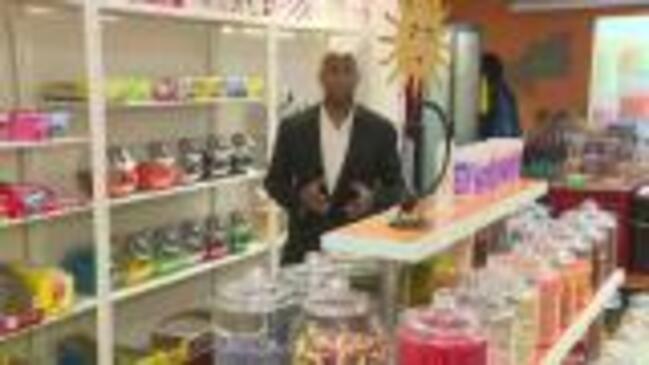Rare Earth Oils, Wolf Lane Distillery, Mungalli Creek Dairy: Top niche businesses of FNQ
These champion Far North small and medium-sized businesses are building success. Read about the keys to their business and how they’ve grown from ignition to fruition.
Cairns
Don't miss out on the headlines from Cairns. Followed categories will be added to My News.
The Far North is home to small and medium-sized businesses smashing it with their business acumen, their work-life balance and their products.
They are serving growing numbers of customers, helping drive the local economy, adding to the character of the Far North and saving the earth as they go.
This region is home to plenty of standouts making customers take notice around Australia – and the world – and these are some of the best.
Rare Earth Oils
“Conscious commerce” might not be a term that comes readily to mind when you think of the oil industry, but it is front of mind for Rahm Adamedes and Meleuka Morton-Masterman of Kuranda’s Rare Earth Oils.
For more than 20 years they have worked in youth, media, language and culture preservation projects in remote Indigenous communities in places such as the central desert and Torres Strait.
They have turned their interests and commitment to social justice into a business for change for the better.
“The way to generate long-term social change is through conscious commerce, generational change,” Rahm said.
“As a foundation we partnered with Australia’s largest media charity, Unlimited, we developed partnerships with NGOS, and then we decided to develop our own social enterprise for long term sustainability.”
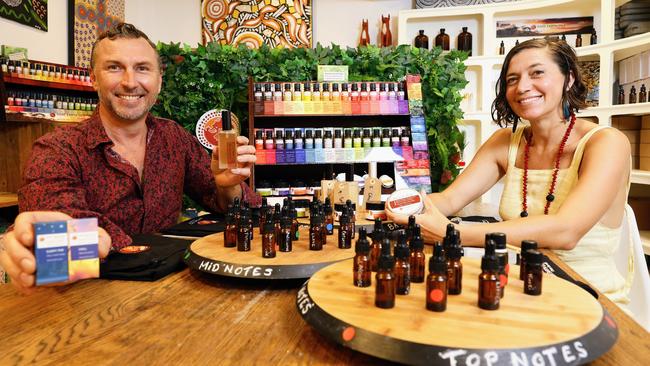
That social enterprise, founded by the Rare Earth Foundation, is Rare Earth Oils, a business that harvests the medicinal capacities of native plants and produces Australian plant oils, fusing them with European herbal traditions and Ayurvedic (Indian) medicine.
It all has the aim of developing economic independence, or “long term outcomes” for Indigenous communities.
It’s taken a few years for their business to be strong and independent enough to do that. They were clear that first and foremost they wanted to make their enterprise viable.
“We’ve created a social enterprise and the foundation is established now to promote and protect endangered languages, and to share culture with non-Indigenous people.
“We are facilitating trans-generational change through enterprise to promote the sovereignty of Indigenous elders.”
And in Rare Earth Oils Rahm and Meleuka have created a business that stands on its own.
They wild harvest and distil, among others, three distinct species of eucalypt, and with a bit of tweaking have created an organic alternative to Vicks Vapour Rub.
They’ve made what he calls a “hot and spicy” muscle rub for pain and circulation, another product to help heal the skin, organic balms, and with the JCU chemistry department they have transformed one of their oils into “one of the strongest insect repellents in the world”, he said.
“We’re producing in a global market where some of the largest producers are in Brazil and China.
“We’ve had to make a high quality oil, and innovate with chemistry to get a competitive advantage to maintain our commercial viability.”
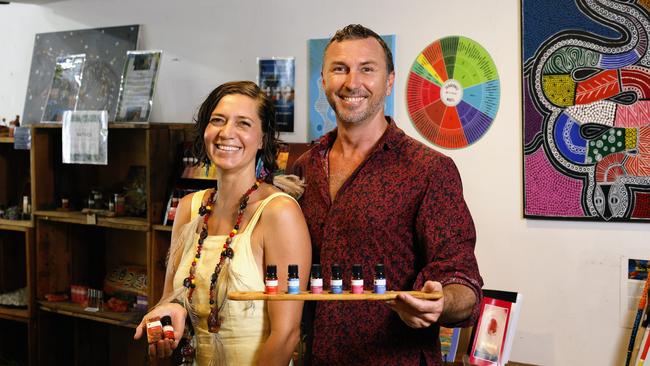
Rare Earth Oils, he said, is poised to compete in the market with large pharmaceutical companies creating cheaper products.
“To be successful and survive in business you need to think globally and act locally, and we want to be the best,” he said.
“To maintain commercial viability (we have to) operate globally to be economically viable.”
He says many small businesses may not consider international trade and the logistics, packaging and marketing that goes with it, but without that, they are just another small business never able to break out of the local market.
“Adapt, diversify, evolve or die,” he said.
Wolf Lane Distillery
With a swag of awards already under their belt, Wolf Lane Distillery is turning heads not only in Australia but all over the gin-drinking world for their locally brewed gins and liqueurs.
Darren Barber and business partner Sam Kennis had a couple of Cairns bars – Three Wolves and Gin Social at the Hilton – and Darren says they enjoyed trying different gins and the nuances of flavour they instilled from diverse regions.
So distilling their own gins was already only a short step away, even though they had zero experience themselves at distilling.
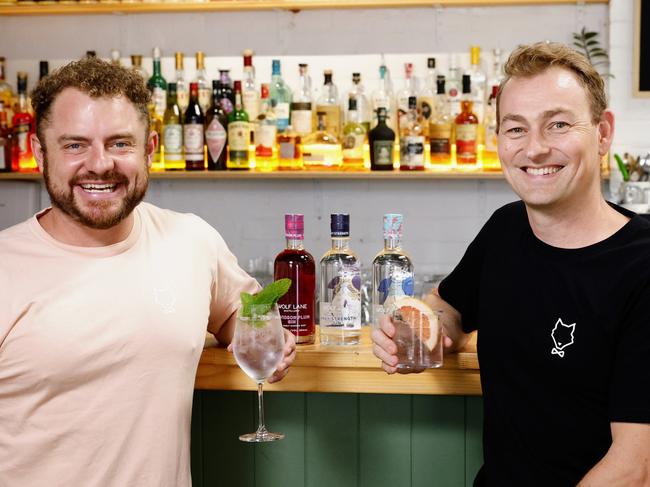
“Initially we never thought the idea would take off as well as it has,” Darren said.
“It was a bit of fun but it’s turned into a good-sized business, and we’re employing local staff.”
Not only a good business and local jobs, but the awards seem to keep coming in, with the distillery winning the World’s Best Navy Strength Gin in 2020 and the Gin Guide Awards in London, Australian Liqueur Distillery of the Year for their ‘The Barista’ coffee liqueur at the New York spirits awards, and multiple gongs for their tropical gin.
Twenty-seven awards in all so far, not too bad for some blokes who thought they’d try out a bit of an idea.
“It’s a universal spirit, more so than whiskey and rum, and you can throw your own spin on it,” Darren said.
“Especially for regions which can use their own botanicals to that area.
“We were the first distillery to use fresh mango in the gin, and our combination of mango, grapefruit and fingerlime from the Tablelands – they make up the major components of our tropical gin.”
They also make a gin with local Davidsons Plum. Without giving too much away, Wolf Lane soak their bush tucker plums in the gin for around three months, add a little sugar and wait for the magic to happen.
It’s a tropical take on a traditional sloe gin, substituting sour European sloe berries for locally grown Far North Queensland Davidson Plums.
It creates a gorgeous red drink with an earthy aroma reminiscent of plum jam or stewed rhubarb, he said, with a hint of sweetness.
Their navy-strength gin features local macadamias. And if that’s not exotic enough, Wolf Lane even do a limited edition Christmas pudding gin flavoured with mangoes, honey, Daintree vanilla, cinnamon, raisins, ginger, passionfruit and apples, all aged magnificently in sherry and port barrels from Tasmania’s Overeem Distillery.
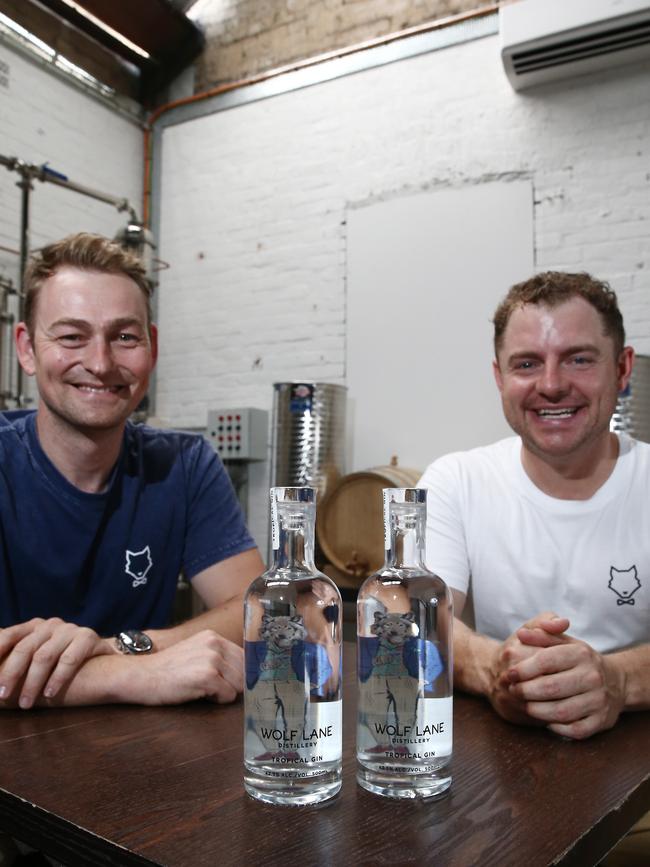
Production takes place in a series of stainless steel holding tanks here in Abbott Street Cairns, but going back a step, to be called gin, the drink has to be distilled from juniper berries.
Australia is not a huge producer of them so like most Australian distillers Wolf Lane source theirs from Macedonia, where they come in a dried form similar to raisins.
The distillery has its own bar and cellar door where they host tastings, gin masterclasses and serve their gin cocktails.
Wolf Lane gins and liqueurs are now in bottle shops pretty much all over Australia, and they have been exporting ready-to-drink cans to Hong Kong as well.
The Barber and Kennis team have set their sights firmly on export, having worked closely and partnered with Trade Investment Queensland to secure export deals.
“We’ve scaled up, we have a large industrial factory and our sales team is increasing.
“For us, we just stick to our story, the quality of the product and we focus on that.
“Our story is the story of the area and the tropical paradise where we live.
“People are drawn to that, the success comes from that.”
Mungalli Creek Dairy
Using fertilisers and poisons on land that was producing food just didn’t feel right to Rob Watson of Mungalli Dairy.
In 1986 he and his brother Danny took over the reins of their parents’ dairy farm in the Tablelands, 10km east of Millaa Millaa, where the family had been farming for 20 years.
Shortly after the brothers converted the farm from conventional to something entirely new.
“We went out on our own and started making cheese,” he said.
“We’d always made yoghurt. We packed predominantly milk, and our point of difference is we’re biodynamic. You can’t go head to head with the big guys and so we’re doing something better.”
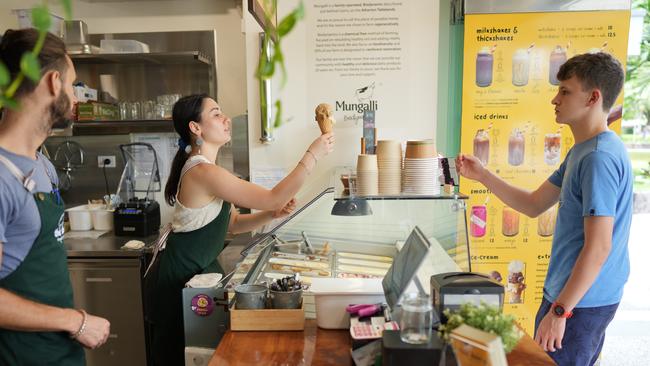
They switched to biodynamics in 1990, which includes rotational grazing and including nitrogen-fixing plants in the pasture mix.
“I didn’t like the poisons, I didn’t like the chemicals, it didn’t feel right,” Rob said of conventional farming.
Biodynamics is all about improving the quality of the soil, and forefront is the notion that nutrient-dense food can’t be produced from nutrient-poor soil.
“It just grows by itself, you don’t need the fertilisers,” he said.
“It takes time, but once you get it right it’s self-sustaining, and it’s significantly cheaper than conventional farming. But you’ve got to have all your ducks in a line. It helps to heal the land.”
Biodynamics includes understanding the soil chemistry, what minerals are working in the soil, and the right ratios of calcium and magnesium.
They were lucky enough to work with Alex Podolinsky in those early days, one of the Australian pioneers of biodynamic agriculture.
Their ice-cream hit the shelves nearly three years ago, just on the eve of Covid and lockdowns.
“It was tricky,” Rob said, “but there were a lot of people at home and it gave them the opportunity to try it.
“They like our cheese and if a new Mungalli product comes along they want to try it.”
Mungalli cheese, yoghurt, quark, feta, flavoured milks and ice-creams are now found in specialty and organic shops all over the east coast, and the ice-cream has hit the overseas market.
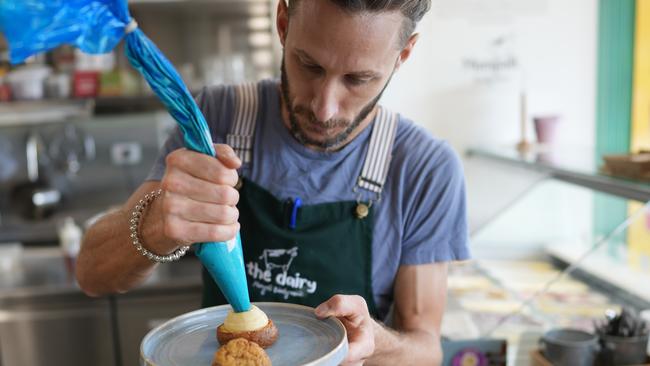
And no other dairy can make their cheese. Taking a leaf out of traditional European cheese producers’ book, their range of flavoured cheeses is called Mungallio, after their region. The cheese is special to their soils, pastures, processes and the particular microorganisms that run the magic of turning milk into cheese.
Rob says their ice-cream is “denser” and brings more flavour, and although he says it’s a little more expensive it has been very well received by the local market.
“We’re not doing too badly, we have a small machine and great ice-cream makers,” he said.
And the business has essential links with the local farming community as they buy from local suppliers of vanilla, coffee and fruit including bananas, passionfruit, mangoes and Davidsons Plum – the latter for their luscious Daintree Rainforest flavour.
“It’s a collaboration with local producers, so a lot of those things we are using in the ice-cream support local farmers,” Rob said.
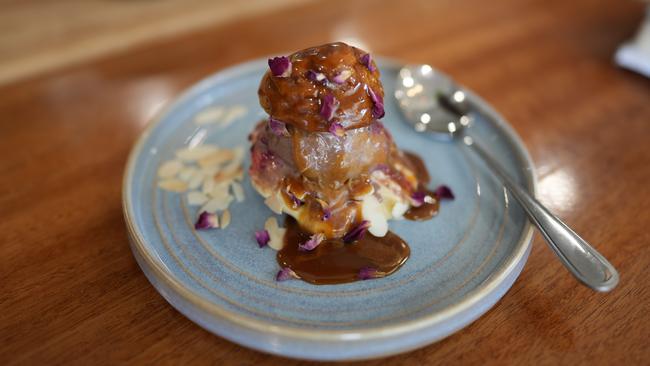
Rob and Michelle say they have a great team working with them, of people who are naturally attracted to what they are doing and who are also as passionate as they are about producing great food as well as looking after the earth for future generations.
That’s probably enough of a marketing plan, if they had one – to produce excellent food with a point of difference, that doesn’t cost the earth.
They make the only Australian lactose-free organic ice-cream, catering to Rob who is lactose intolerant, but to thousands of others as well.
“It’s good to have a point of difference, organic, biodynamic and lactose-free. It’s a great opportunity not to go head-to-head with the big producers,” Rob said.
“We support local, it’s not a mass-produced product, it’s not the same as everybody else’s, it’s a niche product reminding people they are supporting producers who are looking after the land.
“The consumers want it as well. That’s enough of an edge.”
Leah Kelly by Design
From Queen Victoria wearing pineapple fibre underpants to a fashion design business in Kuranda.
It’s not too far of a leap to make.
Really.
Leah Kelly says she has been sewing ever since she was a little girl, and after growing up in the dry west of NSW she moved to Kuranda 30 years ago, built her house off grid, grew a flourishing garden and turned sewing and fashion design into a business, Leah Kelly by Design.
“I’ve pretty much built my business around everything I love,” she said.
“I did a five-year degree in environmental health, and I learnt to sew as a small child so I incorporated that into the equation as to how to make money.
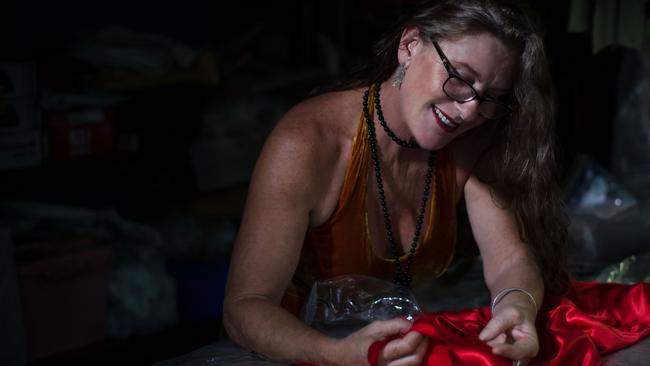
“I started it all from home when my eldest girl was one and she’s now 28.
“I decided I wanted to actually make money working from home.
“I only use natural fibres, and in September at London Fashion Week I had four hemp gowns on the fashion walk.
“And two more were completely in pineapple fibre, which is the most wonderful fibre to work with.”
The fibre, also known as pineapple silk, is made from the spear of the pineapple, which comes equipped with tiny fine hairs.
Those hairs are hand-loomed into an exquisite, silk-like material, which is where Queen Victoria’s undies enter the story.
She apparently ordered her undergarments to be made of pineapple silk after Filipino officials gave her a petticoat and other undergarments made of the fabric.
Filipinos invented pineapple silk in the 16th century after their Spanish colonisers arrived and ordered the locals to stop baring all and cover up.
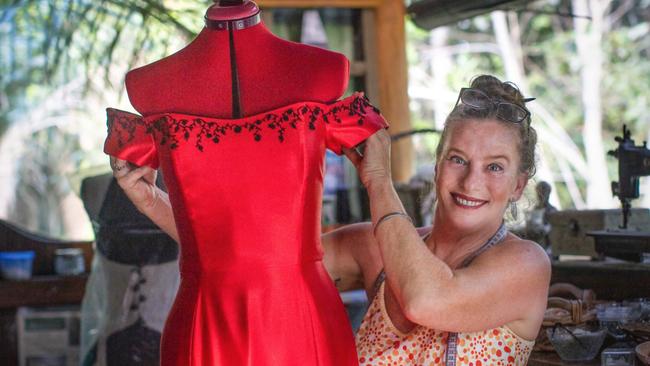
Described as “gossamer-like, diaphanous and with excellent breathable properties”, apparently it was just the ticket for the queen.
And Leah Kelly by Design has now reintroduced pineapple silk to the catwalks of Europe.
“It’s not spiky, it’s the softest of silks, if you get your fingernail and run it across the spear of the pineapple you can see the tiny little hairs,” she said.
Alongside the pineapple silk, Leah uses hemp and bamboo fabrics, but minimises her cotton use because of what she calls the “huge” amounts of water needed to grow it.
“I use a lot of bamboo. The majority of my lingerie is bamboo, and most of the women say it’s the most comfortable they’ve ever worn,” she said.
“Hemp back in the 30s was demonised, but it was all a political stunt to promote the petrochemical industry, because prior to that they used to pay people to grow it.
“I showcased some hemp garments down in Tasmania with the Australian Industrial Hemp Alliance, and I did a huge showcase with them.
“I did another in central west NSW near where I grew up, it would be perfect to grow there because of the overgrazed farming land.
“A lot of farmers are interested in it, the land could be rejuvenated through a crop of hemp. It can grow anywhere.”
As for her designs, Leah has plenty of her own but is flexible and offers alterations to suit individual tastes.
“I do get a lot of women coming to me and men, but the majority are women because I focus on embroidery and fine detail,” she said.
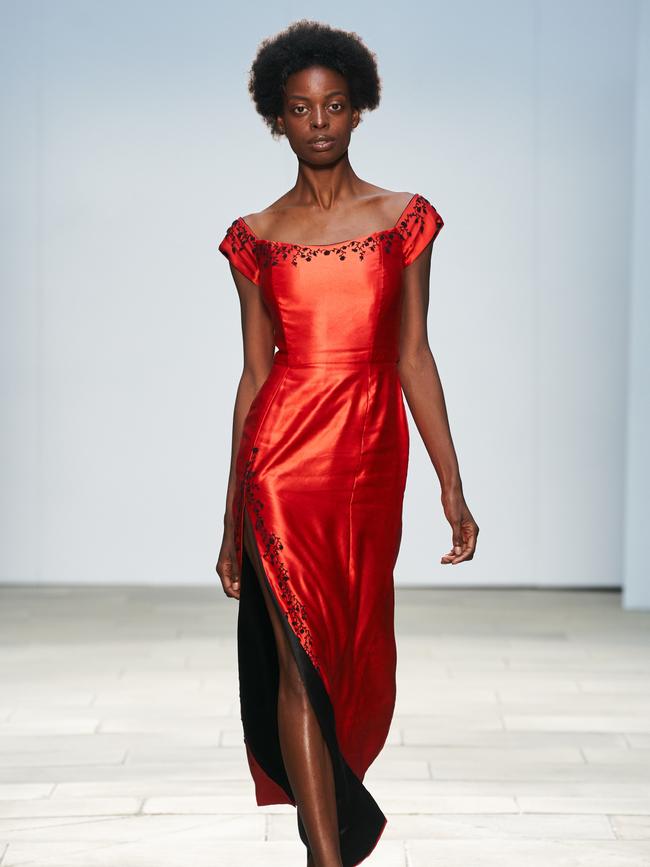
Leah is a believer that we might or at least should be returning to those days, that the trend to buying online is depriving local communities of income and jobs – and quality.
She laments that a lot of government support during Covid went straight out the Australian door as people resorted to buying products online from China and elsewhere.
She says as consumers, we need to readjust our mindset that we can’t support local producers, even if their products come with a slightly higher price tag.
Bury me Standing
From working in a bakery as a teenager in Minnesota, USA, to running two bakeries at opposite ends of the east coast – Cairns and Hobart – Alesha Peckels loves homemade food and the stories behind it.
Her hometown bakery experience stayed with her after she emigrated to Cairns in her 20s to study art at James Cook University.
At that local bakery in Minneapolis she was schooled in wholesome, down-to-earth food, the sort of food passed down and modified through the generations and came with all the trappings of love and family.
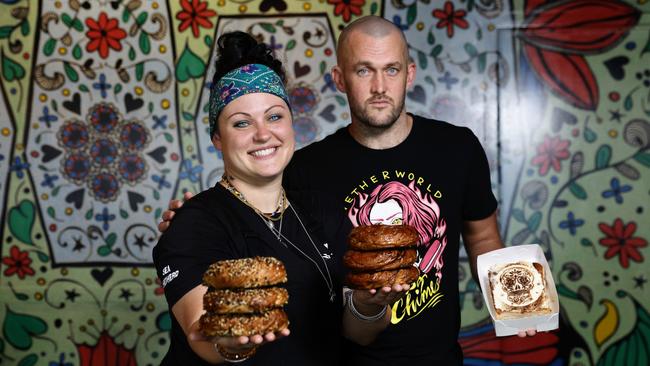
Twenty-five years later and she and husband Cohen Bassingthwaighte spread their time between Hobart and Cairns, running two Bury Me Standing bagel cafes.
“We opened our doors in Hobart about 10-and-a-half years ago,” Alesha said.
“I’ve been in Australia over half my life now.”
She arrived in Cairns first from the States in 2002, then moved to Tasmania in 2011 after cyclone Yasi with her by-then husband Cohen from Yungaburra, co-owner of Bury Me Standing.
He learned to bake at Jackman and McRoss Bakery in Hobart, one of the best bread bakeries in the state, she said, and in March 2012 the original Bury Me Standing opened its doors in Bathurst Street.
Both Cairns and Hobart offer variations on the stock-standard bagel.
“We’ve come up with our own bagels, the gingerbread, the plum duff bagel, it’s one of ours, beetroot bagels as well, they’re bright pink they’re really beautiful,” Alesha said.
“We focus on local and seasonal produce. We get beetroot in Tasmania and people bring it in by the bagful, and when fruit is in season we use it. We always try to use fresh locally produced food.”
Cairns Bury Me Standing opened its doors in October 2021 and judging by the hum around town it has already built a reputation for melt-in-the-mouth pastry, if there can be such a thing, (and the answer is yes), vegan hot dogs, and bright fresh salads.
Food is only part of the story, of course, and Alesha has pursued her art with a range of her limited edition signed prints, merchandise and pannikin cups available at both cafes.
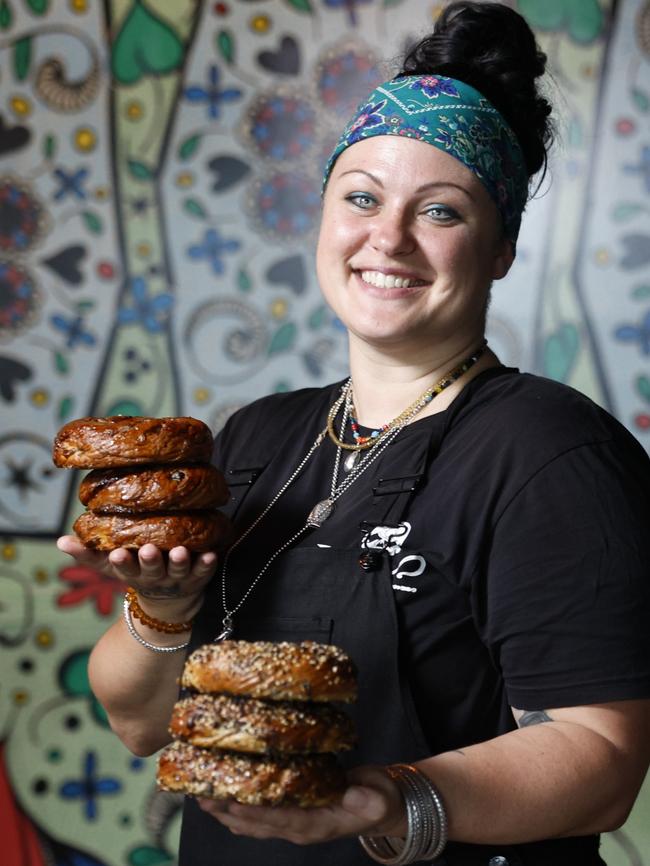
Part of their commitment to the planet is using compostable or reusable packaging, and she says they extended that ethos in setting up the businesses.
Alesha’s art around the walls, influenced by Polish paper cuts, gives the Cairns dining room an Eastern European ambience.
That quirkiness is probably emblematic that they have decided to run the business on their own terms.
“Working as a small business we make sure we don’t have the expectation of being open seven days,” she said.
“We’re a family unit, we make sure we have time for the family as well as the business.”
White Whale Coffee Roasters
Post-Global Financial Crisis was an “interesting” time to start a business, says Ali Slotemaker of Cairns’ White Whale Coffee Roasters.
The fallout from the GFC was a little delayed in Cairns, she said, and she and her partner Steve Lee decided they wanted a business that would work in any economic climate.
“We were renovating and selling houses at the time, and we couldn’t find a house at the right price,” she said.
“The GFC made us think about what we were doing, and we wanted a business that was going to work in a downturn, and in an upturn.
“I’d been into coffee throughout my uni days, but for the roasting side of things we had to upskill ourselves. Steve’s a carpenter by trade, and there are a lot of transferable skills.”
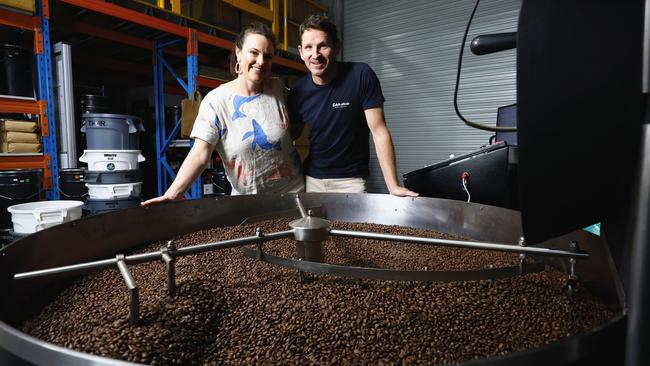
These days coffee roasting courses are readily available in Australia, but back then they were more thin on the ground.
“At the time it wasn’t something you could easily do a course in, but an American roaster was coming out and we were lucky enough to participate in that,” she said.
“We also had some great mentors in Brisbane and that set us up, as well as a couple of chance meetings, and we got to know some generous people along the way.”
Originally from New Zealand, Ali has now been in Cairns for close enough to 18 years, after initially coming here for six months.
She says people can tend to over-complicate coffee, but White Whale’s approach is to roast “approachable coffee that people love to drink”, and that is easy to drink at home.
“It’s a Kiwi-Australian hybrid,” she said.
“Kiwis have a particular way of roasting, we’ve got a hybrid bridge which is the best of New Zealand and the best of Australian roasting.
“We get a great response from our customers, saying it’s the best coffee they’ve ever had, and they really love the flavour.”
She said they established the business under the name Industry One Coffee, and in their first six months of operation they sold as many of their own assets as they could to finance it.
“When we got back from NZ we decided to give our business in Cairns our wholehearted effort. We want to celebrate we’re in Far North Queensland and we’re really proud of that.
“This is what makes us different, coffee roasted in Far North Queensland is what we want to stand for.”
Ali is an environmental scientist by training and that sits well with their ethics.
In October the Cairns Chamber of Commerce sat up and took notice, awarding them the community contribution award, which Ali says was a lovely acknowledgment of their last four years of work.
Their business has compostable coffee cups, they donate used coffee grinds to gardeners, they give away coffee sacks, they offer discounts to customers bringing their own cups in and they have installed solar panels on the roastery’s roof.
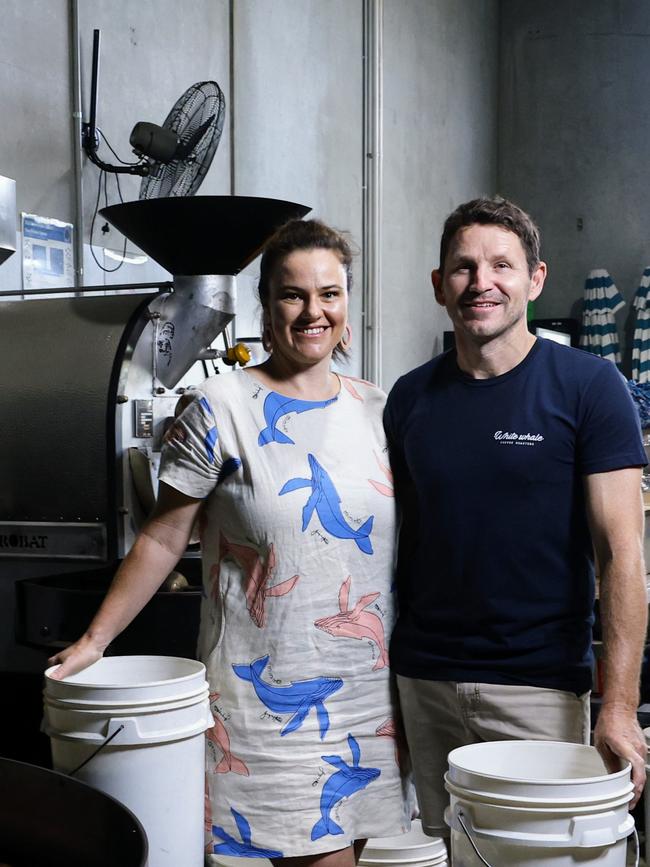
And Migaloo the white whale is part of their story.
“Migaloo migrates up and down the coast, and it’s an Indigenous word for whitefella,” Ali said.
“I think the name does a lot in reminding people about the environment, and that we have to be conscious about the world we live in. We live in this precious world.”
White Whale’s unstinting focus is on their customers.
Ali is a flat white drinker through and through, she says, and White Whale’s Riptide her favourite blend, “rich and cocoa like, almost like chocolate but it doesn’t have chocolate in it, it has a real fruitiness as well”.
Opening in “interesting times”, weathering Covid and continent hopping, Ali and Steve have maintained their commitment to customers.
“We look after the customers we have and serve them the best we can,” she said.
Dukes Doughnuts
From what he describes as a “hobby” or a “passion project” Mike Miller of Dukes Doughnuts has built a lovely family business with an eye-and-mouth-watering array of treats.
Based in Port Douglas, the little home business that grew is about to spread into a shop of its own in Mossman, where he says it will be more of a bakery-style cafe – but with doughnuts still at the core of the business – with other pastries and savoury treats such as pies.
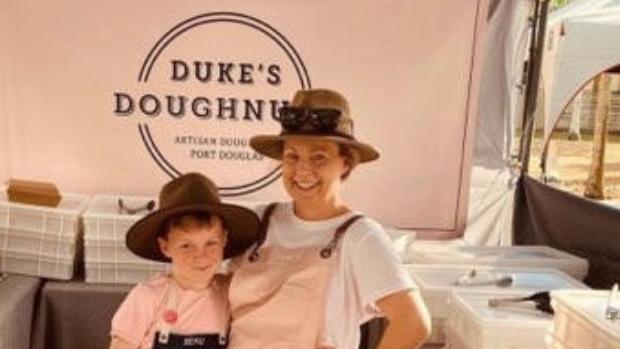
“It was a hobby, a little passion project,” he said.
“We gave some to all our friends and family to try and they were saying we should sell these and we thought, maybe we should.”
Originally from Wisconsin in the Midwest USA, arguably he knew doughnuts pretty well already.
He met his Australian wife Sally when their tracks crossed in Vancouver, and she had lived in Port Douglas for 20 years. When it came time to move to the tropics Port Douglas it was.
“That was 11 years and three kids ago and we think we found our feet,” he said.
Missing the taste of the States he started making his own doughnuts at home.
“We decided we would sell them at Sunday markets, and within three months I quit my full-time job,” he said.
That was nearly six years ago, but being a baker it also wasn’t completely out of the blue because he knew the industry.
Dukes Doughnuts now make around eight variations of doughnuts each week, although they like to shake it up, such as changing the homemade jams every week.
Dukes also produce a variety of custard doughnuts, such as the French cruller doughnut, made with “choux paste” – what eclairs are made with – and is a hybrid, something between a dough and a batter.
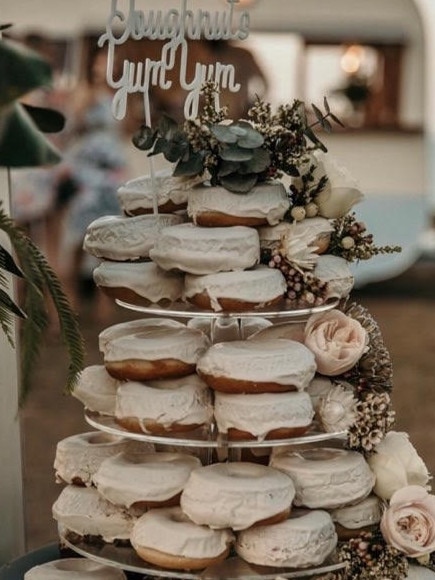
They’re not “fast food” either, because they use a mixture of sourdough fermentation and modern yeast, meaning each batch of dough rises for 48 hours.
“We truly believe it’s the best way,” Mike said.
“Ours are sugary, but they’re not as sweet as the typical Doughnut King, especially because of the sourdough element.
“It’s a savoury element, it was always our big thing, we didn’t want them to be too sweet. We wanted people to eat a doughnut and still want another one.”
He says the most popular doughnut at the moment is the vanilla bean glaze, which he calls “simple, and done really well, and really well balanced.”
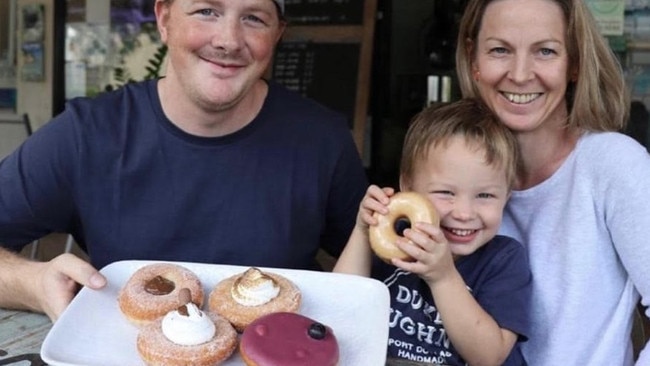
While Cairns is probably the biggest market for Dukes Doughnuts, they have recently announced they are opening their shop in Mossman, just north of Port Douglas.
That’s where they send their children to school, and while they love Port Douglas they found the rent and a landlord to suit them in Mossman.
While he says it’s a “little bit terrifying” and it will mean a bit of a gearing up, he and his family are really looking forward to it.
“I really like the small town fell, but it has all the luxury of the big city and Cairns is close, it’s a nice place to raise our kids.
“It still has that country town feel.”
More Coverage
Originally published as Rare Earth Oils, Wolf Lane Distillery, Mungalli Creek Dairy: Top niche businesses of FNQ

